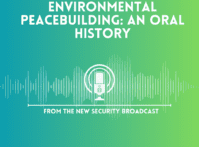-
The 2024 Montreal Climate Security Summit: Four Takeaways
November 25, 2024 By Claire Doyle
“I think we need to approach climate security completely differently,” said Sharon Burke, Founder and President of Ecospherics and Wilson Center Global Fellow, at the recent 2024 Montreal Climate Security Summit. “It’s not just that climate change is an opportunity cost in combat power, or that it’s effecting our bases and operating environment, or that it is an accelerant to instability. It is itself the threat.”
Hosted by NATO’s Climate Change and Security Center of Excellence (CCASCOE) and the Conference of Defense Associations in October, the summit brought together participants from across the government, military, private sector, and civil society to discuss climate change’s escalating impact on global security and share lessons on how we can best respond. So what were some of the key takeaways from the gathering?
Create a More Complete Picture of Climate Security
Throughout the conference, speakers advocated for a broad view of climate security, encompassing economic, social, and economic dimensions. Swathi Veeravalli, Director of Climate Security and Adaptation at the National Security Council, defined climate security as “the resilience of communities, coupled with the stability of nations in a changing climate.” Speakers discussed how climate change affects food security, access to clean water, and health outcomes—all of which contribute to both a communities’ wellbeing and broader stability.
Burke observed that our understanding of climate security must also include relevant earth systems “that are on red alert,” including biodiversity, biospheric integrity, and water. Professor Stefan Rahmstorf, who co-leads the University of Potsdam’s Research Department on Earth Systems Analysis, explained that some systems critical to global stability face dangerous “tipping points”—moments when a series of changes in the climate trigger irreversible, self-perpetuating consequences.
Last year, a report by 200 researchers across 26 countries asserted that triggering these kinds of tipping points “will severely damage our planet’s life-support systems and threaten the stability of our societies.” For instance, scientists expect that even hitting the 2-degree Celsius temperature threshold could precipitate a melting feedback loop for the Greenland Ice Sheet, leading to its eventual total collapse.
The Atlantic Meridional Overturning Circulation (AMOC), which plays a critical role in regulating regional climates, also has a tipping threshold. The AMOC is a system of ocean currents in the Atlantic Ocean that brings warm surface water north, and pushes cooler, denser water south. But increasing freshwater from melting ice in the north Atlantic is beginning to disrupt the system, and studies suggest that the ocean conveyor belt is now at its weakest point in at least a thousand years. “There is a significant risk of AMOC going over the tipping point and collapsing, and that would have major repercussions for the whole climate system,” said Rahmstorf.
Layered onto these climatic tipping points are other factors, noted Janani Vivekananda who heads adelphi’s Climate and Diplomacy and Security program; even a relatively low climate hazard can be high-impact in a fragile context. “It’s really important to look at the interactions between climate and existing socioeconomic and political stability—an additional layer of ‘tipping points’—to understand what some of the security implications will be,” she said.
Advance Holistic Approaches
Given this complex picture of climate security, it’s essential to ensure that we’re all on the same page, noted Vivekananda. “It’s important that we have a common understanding [of climate security] “for political reasons as well as operational reasons.” She suggested that CCASCOE could potentially play a role in facilitating this shared definition of climate security by helping to set parameters for the concept.
There also was consensus that security efforts must be climate-proof, and climate action must be conflict-sensitive. “We can already see how un-climate-proof tactics are undermining people’s resilience on the ground, which is then fueling the root causes of the conflict itself,” said Vivekananda.
In the Lake Chad Region, for instance, security actors’ use of scorched earth tactics (such as closing roads and banning certain crops) has increased recruitment into the very terrorist organizations targeted by those efforts. In the same vein, climate interventions risk being maladaptive if they don’t consider and adjust for conflict dynamics, said Catherine Wong, Global Team Leader for Climate and Security Risk at the United Nations Development Program.
Burke said that a key role military organizations can play in the climate crisis is to “come up with a complete threat picture, as rigorous as it is for China,” and then to help determine “what innovations, what economic development, what changes in the way we live have to happen.” Burke also emphasized that “the force of arms cannot be the main way that we approach the climate issue.”
Respond to Climate Threats in the Arctic
With the Arctic warming at four times the global rate, climate change is profoundly reshaping the strategic environment in the region. In his keynote remarks, Lieutenant-General Michael C. Wright, Commander of the Canadian Army, said that melting ice means that the region is becoming easier to access and navigate, with new maritime routes opening up. Rising temperatures also contribute to melting permafrost, which Wright warned could release dangerous pathogens.
The Canadian Department of Defense has created a specialized “Arctic response team” to meet the challenge, and it is working to retrofit some military bases to increase the efficiency of its operations and lower emissions. Dr. Matthew Rhodes, professor of International Security at the Ted Stevens Center for Arctic Security Studies, emphasized the need to increase professional education on the Arctic for military actors, government officials, and civil society as well. “Our understanding of the Arctic has not kept up with the increased importance of the region,” he said.
Lisa Quiluqqi Koperqualuk, President of the Inuit Circumpolar Council, said that a more complete picture of climate security in the Arctic also would mean investments in food security, healthcare, education, and housing to foster collective resilience in local and Indigenous communities. She called for a dual-purpose infrastructure to support both military responsiveness and community needs growing around communications, freshwater, and more.
Move from Data to Actionable Intelligence
As governments, militaries, and other actors look to advance climate security, data and innovation will play a central role. Yet transforming data into actionable intelligence remains a significant barrier.
Part of the challenge, observed the conference speakers, is the high cost of data processing, along with the lack of streamlined data-sharing channels. Creating centralized data hubs or a single access point for climate data could facilitate better collaboration among defense agencies, governments, and NGOs, speakers noted.
One tool that has been effective in harnessing data to inform policy makers and practitioners is the Famine Early Warning Systems Network, or FEWS NET. The tool integrates analyses on global and local trade, climate impacts, and conflict to forecast food security crises. The network’s director, Kiersten Johnson said that FEWS NET has “stayed focused on its mission of averting food crises, while also always ensuring that [they] are leveraging the very best data, technology, data-collection methodologies, and methods of analyses—many of which are facilitated by improved computer processing power.”
Johnson added that sitting down with decision-makers is key to making data useful: “To move from a state of data-proliferation to intelligence-generation, we need to understand the questions that decision-makers are trying to address. What fundamentally do they need to know to make decisions? It is something that takes time, collaboration, partnership.”
The conversations at the 2024 Montreal Climate Security Summit made clear that addressing climate is a core security issue. “We have a CO2 concentration increase in the atmosphere to levels that we have not seen for 15 million years on this planet,” said Rahmstorf. With tipping points fast approaching, the Arctic warming, and disasters worsening, government, military and defense sectors must recognize climate change as a primary threat to stability.
Wong suggested that, above all, political will needs to accelerate. “Probably the biggest threat is likely to be the lack of political will—the political economy of climate change,” she said, “and the fact that we have the best possible data at our fingertips, that we know what we need to do, but we are not making decisions that are best for the most vulnerable communities and future generations.”
Sources: Global Tipping Points; Mongabay; Science; USAID
 A Publication of the Stimson Center.
A Publication of the Stimson Center.






